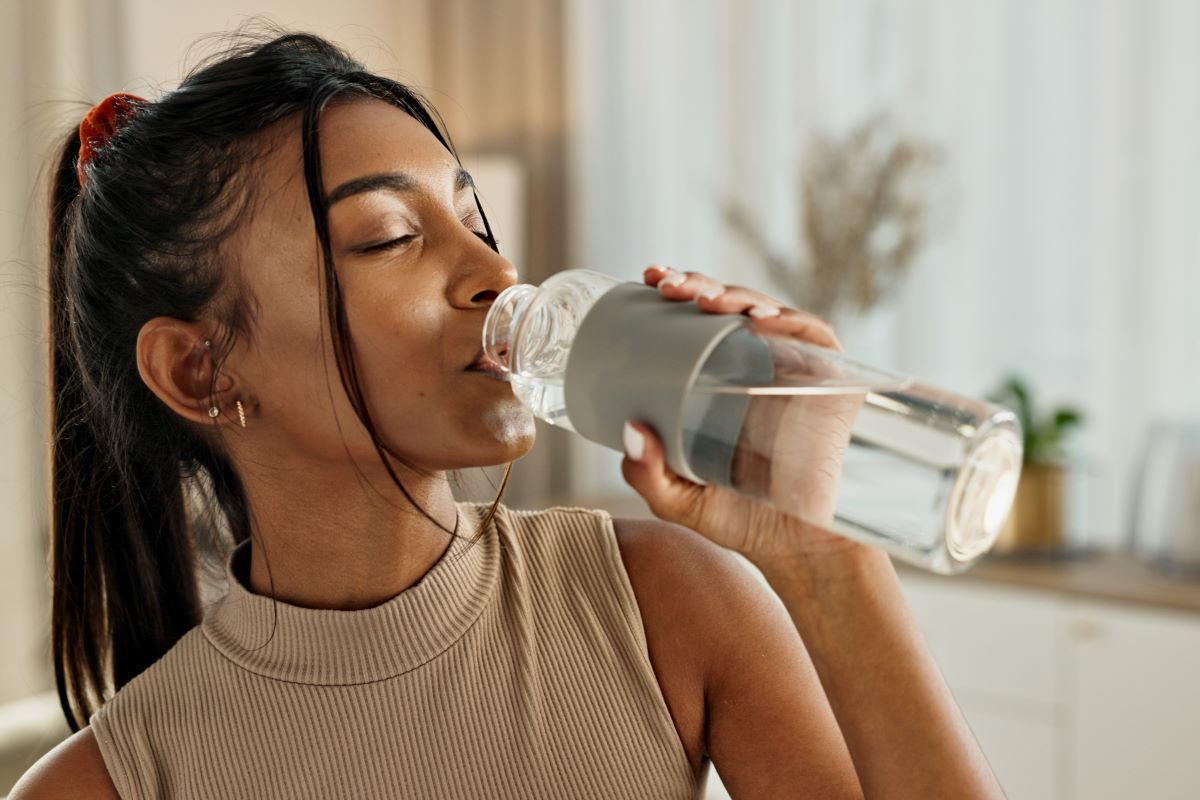
Did you know that Georgia is one of six southeastern states that make up the “Stone Belt”? It’s true — the risk of nephrolithiasis, or kidney stones, is up to 50% higher compared to the Northwest. Genetic, environmental and metabolic factors influence risk. Eighty percent of stones contain calcium, primarily calcium oxalate (CaOx) and less frequently calcium phosphate (CaP). Other types of stones are less common.
Although each stone type has unique features, all stones form due to urine that is supersaturated with insoluble compounds. This could result from a decreased urine volume, overexcretion of stone-forming substances, or underexcretion of inhibitors of stone formation (i.e., citrate). When oxalate binds with calcium in the urine, CaOx stones are more likely to form.
Nutritional goals to prevent calcium oxalate kidney stones are numerous and may include: drinking adequate fluids, maintaining a low Sodium diet, consuming adequate but not excessive amounts of calcium, decreasing animal protein intake, avoiding excessive vitamin C supplementation, supplementing with Potassium citrate and avoiding foods with high amounts of oxalate.
The most important and easily modifiable dietary factor to reduce stone risk, regardless of stone type, is fluid intake. Orange juice and sweetened soda are not recommended due to fructose content; however, water, coffee and tea are acceptable beverages to help meet this goal. If you have a personal or family history of kidney stones, it is recommended that you consume 2.5-3 liters of fluid daily.
There is consensus that low calcium intake (<800 milligrams/day) promotes stone formation. A large cohort study also showed higher dietary calcium intake lowered risk of stones after controlling for other risk factors. Thus, a general recommendation of 800-1,200 milligrams per day is recommended for stone-formers. It is best to consume this from calcium-rich foods rather than supplements.
It is difficult to assess the risk that dietary Oxalate poses because urine oxalate levels are not always proportional to the amount of dietary intake. Oxalate absorption varies widely amongst various food sources and between individuals, and reliable information on the oxalate content of foods is still lacking. Some examples of foods containing high oxalate content include chocolate, almonds, spinach, soy products and raspberries.
The recommendation to reduce sodium intake is well-founded. Dietary sodium restriction decreases urinary calcium levels and can be an important strategy in preventing stones, especially in individuals with idiopathic hypercalciuria.
High potassium diets decrease calcium excretion and increase urinary citrate. Studies show dietary potassium supplementation decreases kidney stone risk in men and older women. Magnesium may decrease kidney stone risk by reducing oxalate absorption in the gut; however, the efficacy of using magnesium to reduce risk has not been well established.
Protein restriction, especially animal proteins, may be of benefit. In addition, women with high phytate intake (found in plant tissues) had a 36% lower risk of stone formation. The exact mechanisms of these potential benefits are not completely understood.
Vitamin C is one of the most widely used over-the-counter supplements and additives in beverages, and one of its metabolites is oxalate. It is recommended not to exceed 1,000 milligrams of vitamin C per day for those with a history of kidney stones.
As the weather heats up in Georgia, make sure your water bottle is full — and maybe add some lemon for extra citrate!
Find more tips from Northside Hospital Nutrition Services.
References
- Romero, Victor, Hakan Akpinar, and Dean G. Assimos. "Kidney Stones: A Global Picture of Prevalence, Incidence, and Associated Risk Factors." Reviews in Urology 12, no. 2 3 (Spring 2010): e86 96.
- Evan, Andrew P. "Physiopathology and Etiology of Stone Formation in the Kidney and the Urinary Tract." Pediatric Nephrology 25 (2010): 831 41.
- Siener, Roswitha. "Nutrition and Kidney Stone Disease." Nutrients 13, no. 6 (June 3, 2021): 1917.
- Ferraro, Pietro M., Eric N. Taylor, Giovanni Gambaro, and Gary C. Curhan. "Soda and Other Beverages and the Risk of Kidney Stones." Clinical Journal of the American Society of Nephrology 8, no. 8 (August 2013): 1389 95. https://doi.org/10.2215/CJN.11661112.
- Yuan, Shuai, et al. "Coffee and Caffeine Consumption and Risk of Kidney Stones: A Mendelian Randomization Study." American Journal of Kidney Diseases 79, no. 1 (2022): 9 14.e1.
- Sorensen, M. D. "Calcium Intake and Urinary Stone Disease." Translational Andrology and Urology 3, no. 3 (September 2014): 235 40.
- Bargagli, Marta, Maria C. Tio, Sushrut S. Waikar, and Pietro M. Ferraro. "Dietary Oxalate Intake and Kidney Outcomes." Nutrients 12, no. 9 (September 2, 2020): 2673.
- Nouvenne, Antonio, Tommaso Meschi, Beatrice Prati, Andrea Guerra, Francesco Allegri, Giovanni Vezzoli, Laura Soldati, Giovanni Gambaro, Umberto Maggiore, and Loris Borghi. "Effects of a Low-Salt Diet on Idiopathic Hypercalciuria in Calcium-Oxalate Stone Formers: A 3-Month Randomized Controlled Trial." American Journal of Clinical Nutrition 91, no. 3 (March 2010): 565 70.
- Ferraro, Pietro M., Erin I. Mandel, Gary C. Curhan, Giovanni Gambaro, and Eric N. Taylor. "Dietary Protein and Potassium, Diet-Dependent Net Acid Load, and Risk of Incident Kidney Stones." Clinical Journal of the American Society of Nephrology 11, no. 10 (October 7, 2016): 1834 44.
- Eisner, Brian H., Sonal Sheth, Stephen P. Dretler, et al. "High Dietary Magnesium Intake Decreases Hyperoxaluria in Patients with Nephrolithiasis." Urology 80 (2012): 780.
- Curhan, Gary C., Walter C. Willett, Elizabeth L. Knight, and Meir J. Stampfer. "Dietary Factors and the Risk of Incident Kidney Stones in Younger Women: Nurses' Health Study II." Archives of Internal Medicine 164, no. 8 (April 26, 2004): 885 91.

